- Home
- Robert Goddard
The Fine Art of Invisible Detection Page 2
The Fine Art of Invisible Detection Read online
Page 2
‘Did she receive any?’
‘It was not likely she would, was it? A blurred photograph. Fifteen years after the event. With scant information. And all on the chance that someone who might know something would read that particular newspaper.’
‘On that particular day.’
Kodaka smiled. ‘Actually, the notice ran twice a week for a month.’
‘But, still, she heard nothing?’
‘Not at the time.’
‘Nor since?’
Kodaka’s smile broadened. He couldn’t stop himself taking pleasure from such twists of fate as his clients sometimes brought him. And clearly there’d been such a twist in the matter of Mimori Takenaga. ‘She had a letter … last week.’
‘After twenty-seven years?’
‘Remarkable, no?’
‘Very.’
‘The letter was sent on to Takenaga-san at her current address by the occupant of the house the Masafumi family had lived in back then. It was from an Englishman called Martin Caldwell. He said he had only recently seen the advertisement and believed he knew who Peter Evans was. That was not his real name, apparently. Caldwell did not say who Evans really was, but he implied there was a mystery surrounding him. Caldwell was willing to meet Takenaga-san to discuss the matter. Could she come to London for the purpose? He was not interested in the reward, but he was interested in helping her discover the truth, if she still wanted to pursue the matter.’
‘As she does.’
‘Oh yes. But she cannot go to London. Her husband takes the same view as her uncle of her father’s long-ago supposed suicide. He would not allow her to go. She can contact Caldwell and arrange a meeting, since he has supplied her with his email address, but she cannot meet him. Even coming here had to be done under the cover of a shopping expedition. However, since Caldwell has never met her, there is no reason why someone claiming to be her – a woman of about her own age, suitably briefed and fluent in English – could not go instead.’
Silence fell. The implication was obvious. Kodaka had a mission for Wada. One more challenging than anything he’d previously asked her to do. She waited for him to make the request specific, but he seemed reluctant to do so. He sipped his tea and smiled weakly at her. Eventually, she took pity on him. ‘You want me to go?’
He nodded. ‘If you are willing.’
TWO
IT WAS A cool, still, fitfully bright afternoon in london. Commuting home by clipper ferry was one of the pleasures of Nick Miller’s day. It was more pleasurable than usual this Friday because it was the start of the Easter holiday. He had three weeks of leisure to look forward to. No teaching. No commuting. And nothing to stop him doing some serious painting, especially for the first week, when his wife would be away with her friends in Tuscany.
The trimmed beard, unstructured jacket and loosely knotted tie marked him out as some kind of artistic professional. The tinted monoliths of Canary Wharf the ferry cruised past clearly weren’t his natural territory. He surveyed them from the aft deck as he took sips of black coffee he hoped would clear his head after one end-of-term drink too many. And he wondered if Kate would be at home when he got there. It was end of term for her too, but she’d said something that morning about going round to Harriet’s after leaving school to finalize arrangements for setting off the following morning.
She’d also asked him to buy some Parmesan cheese on his way home. As far as he could recall from a hustled conversation as they were both leaving the house, the cheese was the full extent of the shopping expected of him, which suggested dinner would be some pasta dish. He thought he might buy a bottle of wine to wash it down. Something Tuscan, maybe, to put Kate in the mood for her trip with the girls.
They were pleasant, simple thoughts for a spring afternoon turning towards evening. Then he realized, with something of a jolt, that he hadn’t thought about his mother all day.
That had to be some kind of milestone, even though, in a sense, he’d done most of his mourning before she’d actually died, just after Christmas. And she wouldn’t have wanted him to feel guilty about moving on with his life. No longer having to worry about her condition, her prognosis – how much of a future she had and how it was going to end – was a relief he hardly wanted to acknowledge, even to himself, though she’d told him that was how it would be. She’d worked as a psychotherapist, after all. She’d known how such things worked.
‘I’m OK, Caro,’ he murmured. She’d weaned him off ‘Mummy’ when he was about ten and insisted, in keeping with her New Age principles, on his using her first name. He took a deep breath of the crisp river air as he pictured her smile in his mind’s eye. ‘Forty-one and a stone overweight. But OK.’
Most of the passengers still aboard left with Nick at Greenwich. He headed for the shops, bought the cheese and wine, then ambled through the grounds of the old Royal Naval College and crossed Trafalgar Road. He was in no hurry. Whether Kate was home or not, he anticipated a late supper, in the kitchen, relaxing and swapping expectations for their different weeks ahead.
Greenwich Park rose ahead of him, long shadows stretching across its grassy slope, as he walked along Greenwich Park Street towards home. He led a privileged life. He knew that. Without Kate’s family money they’d never be living in such a lovely part of London. The park, the college, the river. There was nothing to dislike about Greenwich except the hordes of tourists. Caro had often reminded him just how privileged he was. And, if she didn’t, April, her partner of forty years, could be relied on to do it for her. Well, at least she was still there in his life to chip away at any signs of complacency.
He bounded up the steps to the yellow front door of their Georgian house and let himself in. The beeping of the alarm and the slew of post on the mat told him Kate wasn’t home yet. No surprise, really. He silenced the alarm and carried the shopping into the kitchen, where he noticed the green message button flashing on the landline phone as he stood the carrier bag on the marble worktop. He went back to the front door to collect the post, then returned to the kitchen, sifting through the envelopes as he went. None of it looked very interesting.
He pressed the button on the phone. There was only one message, which, subconsciously, he assumed would be something trivial, since he’d have heard about anything important via his smartphone.
‘Nick, this is … Martin Caldwell.’
Martin Caldwell? What did he want? They barely knew each other. He was a friend of Caro’s from student days. And of April’s. They’d shared a house in Exeter with several other students during their last year at the university. He’d come to Caro’s funeral and Nick recalled meeting him a few times before that, spread over a lot of years. They’d exchanged a few words during the wake. But there’d been nothing to suggest Nick would ever hear from him again.
‘You’re probably wondering why I’m phoning you … out of the blue … like this.’
Nick was wondering exactly that. Caldwell’s voice – soft, hesitant, unassertive – summoned for Nick a clear memory of his appearance at the funeral. Lean and hunched, with a narrow face and grey hair worn too long, he was one of the few mourners who’d opted for black suit and tie, even though the suit didn’t fit properly. He’d kept saying he couldn’t believe Caro was dead. ‘She was always so alive.’ After a short while, Nick began to find him annoying and slipped away, leaving Caldwell … alone. Was that it, perhaps? Was he simply lonely?
‘It took me a long time to find your number. I jotted it down after … you called me … about Caro’s funeral.’
Nick had forgotten doing that. But he’d phoned quite a lot of people at the time, to take some of the load off April. He had no recollection of their conversation. There was no reason why he should.
‘The thing is, something … rather surprising … has happened. And it, well, it’s … something I think you need to know about. I mean … really need to know about.’
It was hard, if not impossible, to imagine what he could possibly be talking about.
Nick waited, wondering if Caldwell was actually going to say what it was in the message.
‘Could you phone me back as soon as possible, please? It’s really … well, rather urgent. I’m going to be in London early next week. Could we, er … meet? I, er … seriously think we should. Give me a call … when you get this.’ He recited his number.
Nick didn’t think Caldwell lived in London. He seemed to recall someone saying, perhaps Caldwell himself, that he’d never actually left Exeter after university and had spent his working life in the city. And Nick had been told something else about where Caldwell lived that lay just out of his memory’s reach.
‘Leave a message if I don’t answer and I’ll get back to you as soon as I can. I’ll, er … look forward to hearing from you.’
The message ended. Nick pondered what to do. It seemed unlikely he really did need to know what Caldwell had to tell him. But he was going to have to find out, just to put his mind at rest. And it would be easier to do that before Kate got back. He brewed some coffee and carried it upstairs to the study.
Sitting down at the desk, he listened to the message again, which made no more sense second time round, then dialled Martin Caldwell’s number.
It rang a long time before Caldwell answered. Then, ‘Hello?’ came the doleful voice, quite suddenly.
‘Martin? This is Nick Miller.’
‘Ah. Nick. Yes. Er, thanks … for calling back.’
‘How can I help you?’
‘Well, can we meet, as I suggested? I’m, er … going to be in London on Monday. I’m guessing you’ve just started your Easter holiday. You teach, don’t you?’
‘Yes.’
‘So, could we …’
‘What’s this about, Martin?’
‘About?’
‘Yes. Whatever it is, can’t we discuss it now, over the phone?’
Long pause. ‘No. No, I don’t think that would be … a good idea. It’s … complicated.’
‘Can’t you give me some inkling of what this is about? You said in your message something surprising had happened.’
‘Well, it has.’
‘And what is it?’
‘I can’t … Look, Nick, I don’t want to tread on any toes, but I think you’re entitled to know.’
‘Know what?’
‘Well, it’s … about your father.’
‘My father?’ What was the guy talking about? Nick had never known his father. Geoff Nolan, another occupant of the shared house in Exeter, had refused to have anything to do with Nick’s upbringing and had died of a drugs overdose before he was thirty. A long time ago Nick had tried to track down Nolan’s family, without success. All he had to remember his father by was one fuzzy snapshot given him by Caro.
‘Yes. Like I say, it’s … complicated. I’d be much happier … talking about it face to face. Is Monday any good for you?’
‘You’re going to have to give me something more now you’ve mentioned my father, Martin.’
‘And I will. On Monday. We really shouldn’t … discuss this on the phone.’ The hint of cloak and dagger irritated Nick. In fact, Martin Caldwell was pretty irritating all round. ‘You live in Greenwich, don’t you?’
‘Yes. But—’
‘Shall I come there? Around … mid-afternoon?’
Nick took a moment to think. He could continue badgering Caldwell into telling him what the hell this was all about right now or he could just let him have his way. In the end, the easiest course was to give in. ‘OK. If you really think it’s important.’
‘Oh it is. Yes. Definitely. I can’t really … overestimate its importance.’
No? That seemed unlikely. But Nick supposed there was an outside chance it would at least be interesting. Perhaps it was something Caldwell had felt unable to disclose while Caro was alive. Nick couldn’t help being curious. Caldwell had undeniably known his father, after all. They’d lived under the same roof for a year. ‘Monday it is, then. Shall we say four o’clock?’
‘Yes. Let’s say that. What’s your address?’
After the call had ended, Nick leant back in the chair and thought about the father he’d never known. According to Caro, she’d still been confused about her sexuality during her time at university. Geoff Nolan had inadvertently helped her decide that men weren’t for her. He’d always been a hopeless case, heading for early burn-out and wanting to know nothing – absolutely nothing – about his son. So why should Nick want to know anything about him?
There was no good reason. He pulled out from one of the desk drawers the old cigar box in which he kept assorted mementos of his childhood, including that solitary creased photograph of Geoff Nolan, aged twenty-one or so, sitting astride his motorbike at a kerbside and looking up at a first-floor window where Caro, presumably, was poised with the camera. He was in black biking leathers, one hand resting on a crash helmet, propped on the fuel tank, while his other hand was raised in a strangely lordly greeting. Long dark hair flopped over his forehead. His smile was somehow not genuine. It seemed calculated to mock something or someone, possibly himself.
Nick wouldn’t have wanted to admit how often he’d looked at that photograph when he was younger, trying to draw some clues to his father’s personality from his posture and expression. But there were none to be found. It was just a snapshot of a headstrong young man who’d had no idea he wasn’t going to see out his twenties. It was just a picture. Geoff Nolan wasn’t really there. He never had been.
Nick put the photograph back and replaced the box at the back of the drawer. Then he heard a noise downstairs – Kate’s key turning in the front door lock. On a sudden impulse, he picked up the phone and deleted Caldwell’s message.
‘Darling?’ came Kate’s voice from below.
‘Up here,’ he shouted in reply.
‘Did you remember the cheese?’
‘I remembered.’ Caldwell’s message was gone now. Removed from the log. Kate would be in Tuscany all next week. There was no need for her to worry about what Nick was or wasn’t going to learn from the guy. He’d tell her when she got back – if there was anything to tell.
‘There’s a bottle of red wine down here I’m tempted to open.’ She was in the kitchen now.
‘Succumb to temptation, then.’ Nick put the phone down, stood up and headed for the door, confident he could put Martin Caldwell out of his mind. Until Monday.
THREE
MIMORI TAKENAGA HADN’T yet replied to martin caldwell’s invitation to meet in London, so the first item of business for Wada, having agreed to go to London on her behalf, was to contact him. She kept the message brief but courteous and signed herself off as Mimori Takenaga family Masafumi. The swiftness of Caldwell’s response took her and Kodaka aback. Within an hour, after a few more email exchanges, they had an appointment for the following Tuesday morning, at the British Museum tea room.
There was no denying, though Wada would have denied it, that she was excited about her mission to London. She’d only been there once before, with Hiko, during a honeymoon holiday in Europe. All she remembered of the city were the traditional picture postcard scenes: Big Ben, Buckingham Palace, Tower Bridge, Trafalgar Square. It would be interesting to discover how returning to somewhere she’d only ever been with Hiko would affect her. And even if it turned out to be a waste of time, Mrs Takenaga had already paid Kodaka more than enough to cover the cost of the journey, so there was nothing to be lost by it.
There was, however, something Kodaka didn’t mention to her until after she’d made the appointment with Caldwell. And the timing of his disclosure struck her as suspicious. Had he wanted her to commit herself before he revealed this additional element in the Takenaga case?
‘You should know that Takenaga-san also made accusations against a man her mother told her had been her father’s business partner back in Showa fifty-two. He was never under police investigation, but she claims, again according to her mother, that straight after Masafumi’s death this man took all the money from a
secret bank account they had been operating. There was supposedly a lot of money in the account, accumulated through sokaiya activities. Masafumi had spoken to his wife of a figure in the tens of millions of yen. So his death could be seen as … highly profitable for his partner.’
‘Do we know who the former partner is?’ Wada asked.
‘Yes.’ The time for tea had passed. Evening was encroaching. The shadows within Kodaka’s office were deepening. He pulled out the whisky bottle and poured them both a glass. ‘Hiroji Nishizaki,’ he said quietly.
Wada said nothing for a moment. If one of the country’s leading entrepreneurs, founder and chairman of the Nishizaki Corporation, was somehow implicated in the death of Shitaro Masafumi, then the need to tread carefully – very carefully indeed – hardly needed stating. The Nishizaki Corporation had grown over recent decades into an investment and consultancy giant, prospering initially by buying and selling stakes in other companies, usually at just the right time, and more recently by dispensing expensive advice to those convinced they needed their expert guidance. The corporation had split into two supposedly autonomous branches to avoid any perceived conflicts of interest, Nishizaki Investment and Nishizaki Consultancy. But not everyone was convinced about their autonomy since Hiroji Nishizaki was firmly in charge of both. Was he a leech on the commercial efforts of others? Or a shrewd judge of what was and wasn’t profitable? Opinion was divided, but there was no doubt about Nishizaki’s success. He’d become staggeringly wealthy. And the Nishizaki Corporation was a fixture near the top of the Nikkei index.
‘Do not mention this to anyone,’ Kodaka continued. ‘The fact that Shitaro Masafumi knew Hiroji Nishizaki more than forty years ago – if it is a fact – proves nothing, particularly in relation to the circumstances of Masafumi’s death. We should regard it as background information, nothing more. All you have to do in London is listen to what Caldwell says and report what you learn from him.’

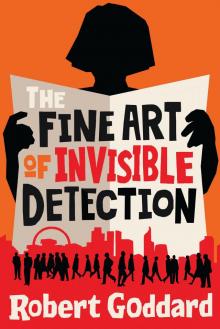 The Fine Art of Invisible Detection
The Fine Art of Invisible Detection One False Move
One False Move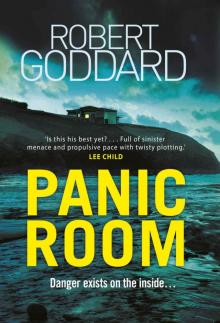 Panic Room
Panic Room Beyond Recall
Beyond Recall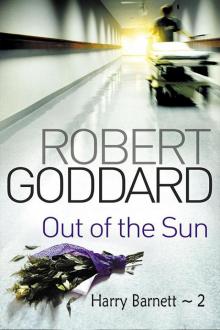 Out of the Sun
Out of the Sun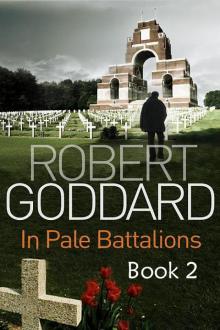 In Pale Battalions - Retail
In Pale Battalions - Retail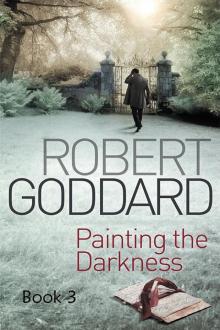 Painting The Darkness - Retail
Painting The Darkness - Retail The Corners of the Globe
The Corners of the Globe Name To a Face
Name To a Face Closed Circle
Closed Circle Caught In the Light
Caught In the Light Into the Blue
Into the Blue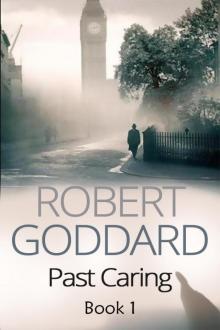 Past Caring - Retail
Past Caring - Retail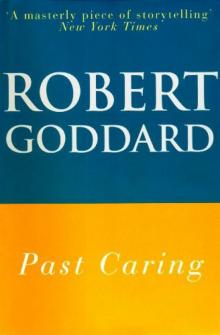 Past Caring
Past Caring Hand In Glove - Retail
Hand In Glove - Retail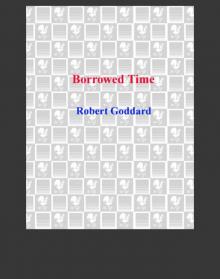 Borrowed Time
Borrowed Time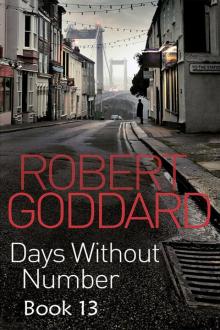 Days Without Number
Days Without Number James Maxted 03 The Ends of the Earth
James Maxted 03 The Ends of the Earth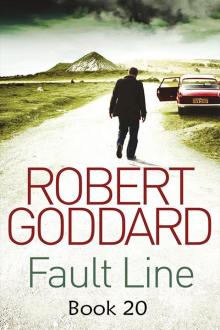 Fault Line - Retail
Fault Line - Retail Play to the End
Play to the End Sea Change
Sea Change Never Go Back
Never Go Back Take No Farewell - Retail
Take No Farewell - Retail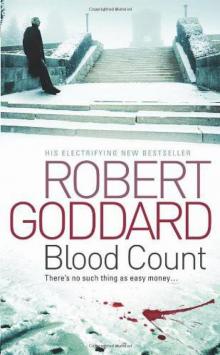 Blood Count
Blood Count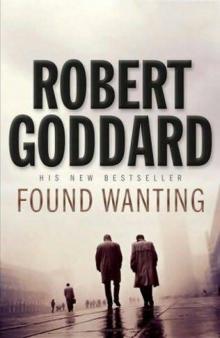 Found Wanting
Found Wanting Sight Unseen
Sight Unseen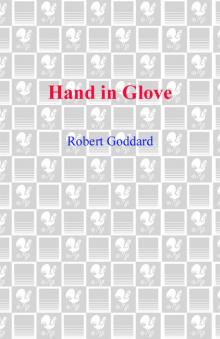 Hand in Glove
Hand in Glove The Ways of the World
The Ways of the World